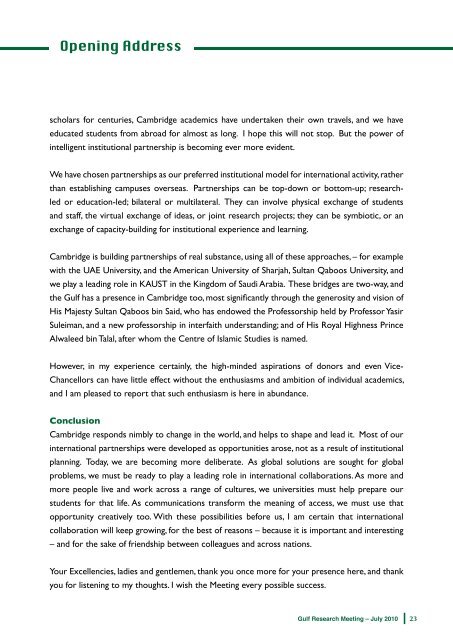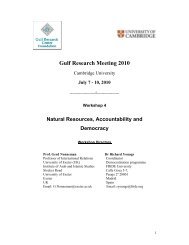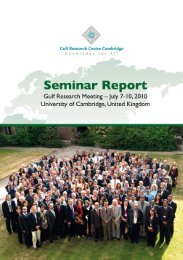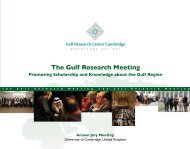GRM 2010 Report - Centre of Islamic Studies - University of ...
GRM 2010 Report - Centre of Islamic Studies - University of ...
GRM 2010 Report - Centre of Islamic Studies - University of ...
You also want an ePaper? Increase the reach of your titles
YUMPU automatically turns print PDFs into web optimized ePapers that Google loves.
scholars for centuries, Cambridge academics have undertaken their own travels, and we have<br />
educated students from abroad for almost as long. I hope this will not stop. But the power <strong>of</strong><br />
intelligent institutional partnership is becoming ever more evident.<br />
We have chosen partnerships as our preferred institutional model for international activity, rather<br />
than establishing campuses overseas. Partnerships can be top-down or bottom-up; researchled<br />
or education-led; bilateral or multilateral. They can involve physical exchange <strong>of</strong> students<br />
and staff, the virtual exchange <strong>of</strong> ideas, or joint research projects; they can be symbiotic, or an<br />
exchange <strong>of</strong> capacity-building for institutional experience and learning.<br />
Cambridge is building partnerships <strong>of</strong> real substance, using all <strong>of</strong> these approaches, – for example<br />
with the UAE <strong>University</strong>, and the American <strong>University</strong> <strong>of</strong> Sharjah, Sultan Qaboos <strong>University</strong>, and<br />
we play a leading role in KAUST in the Kingdom <strong>of</strong> Saudi Arabia. These bridges are two-way, and<br />
the Gulf has a presence in Cambridge too, most significantly through the generosity and vision <strong>of</strong><br />
His Majesty Sultan Qaboos bin Said, who has endowed the Pr<strong>of</strong>essorship held by Pr<strong>of</strong>essor Yasir<br />
Suleiman, and a new pr<strong>of</strong>essorship in interfaith understanding; and <strong>of</strong> His Royal Highness Prince<br />
Alwaleed bin Talal, after whom the <strong>Centre</strong> <strong>of</strong> <strong>Islamic</strong> <strong>Studies</strong> is named.<br />
However, in my experience certainly, the high-minded aspirations <strong>of</strong> donors and even Vice-<br />
Chancellors can have little effect without the enthusiasms and ambition <strong>of</strong> individual academics,<br />
and I am pleased to report that such enthusiasm is here in abundance.<br />
Conclusion<br />
Cambridge responds nimbly to change in the world, and helps to shape and lead it. Most <strong>of</strong> our<br />
international partnerships were developed as opportunities arose, not as a result <strong>of</strong> institutional<br />
planning. Today, we are becoming more deliberate. As global solutions are sought for global<br />
problems, we must be ready to play a leading role in international collaborations. As more and<br />
more people live and work across a range <strong>of</strong> cultures, we universities must help prepare our<br />
students for that life. As communications transform the meaning <strong>of</strong> access, we must use that<br />
opportunity creatively too. With these possibilities before us, I am certain that international<br />
collaboration will keep growing, for the best <strong>of</strong> reasons – because it is important and interesting<br />
– and for the sake <strong>of</strong> friendship between colleagues and across nations.<br />
Your Excellencies, ladies and gentlemen, thank you once more for your presence here, and thank<br />
you for listening to my thoughts. I wish the Meeting every possible success.<br />
Gulf Research Meeting – July <strong>2010</strong> 23





